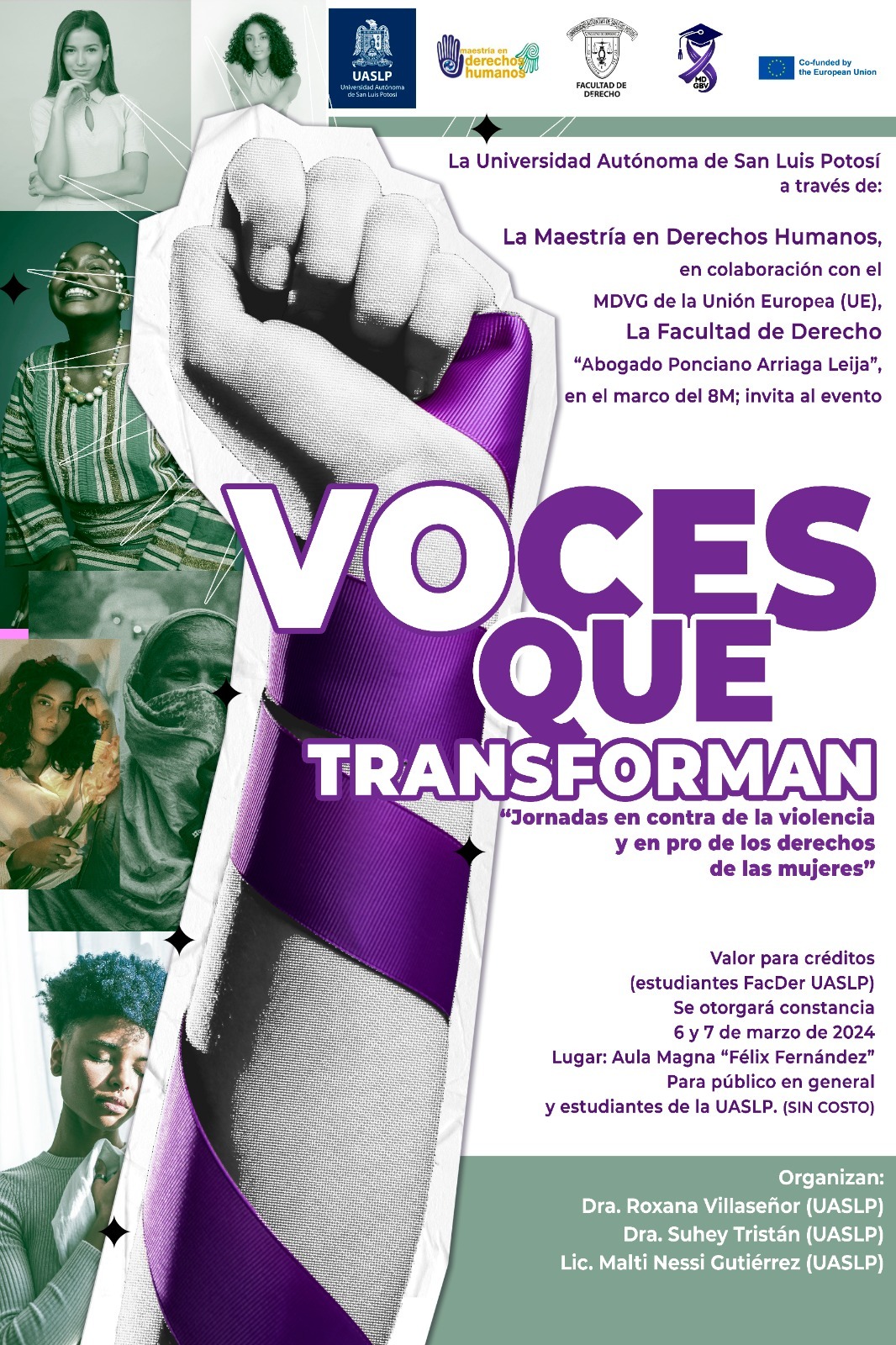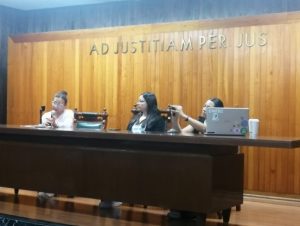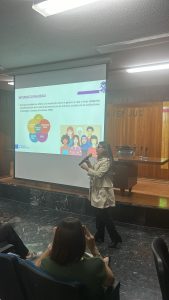San Luis Potosí, San Luis Potosí. January 29th, 2024.
EVENT: “Voices that transform: Academic conferences against violence and in favor of women’s rights”
Organizers: Dr. Roxana Abigail Montejano Villaseñor (UASLP).
Dr. María Suhey Tristán Rodríguez (UASLP).
Lic. Malti Nessi Gutiérrez
General context:
The conferences were part of the “Master ‘s Degree in Gender Based Violence” project, concerning point 7.1 “Dissemination plan”; which aims to contribute to the prevention and eradication of violence against women, where countries such as Slovenia, Greece, Peru, Colombia and Mexico come together. In this sense, it should be noted that the Autonomous University of San Luis Potosí (UASLP) is part of and is financed by the European Union (EU), through “ERASMUS K2”. The Master’s Degree in Human Rights and the Faculty of Law of the aforementioned university converge in its organization.
The conferences were held on March 6 and 7 as part of the commemoration of March 8, which is recognized as “International Women’s Day.” This commemoration has its origin in the struggle of women for equal rights, fair working conditions, and suffrage. Over the years, it has evolved to expose the various problems plaguing women’s lives in multiple spaces of society. It is a day of reflection, awareness, and action at a global level, with various events, marches, and activities that seek to highlight the achievements of women and draw attention to the challenges that remain yet, for example:
In Mexico, March 8 takes on significant relevance in the context of the fight for women’s rights, especially due to the data shown below and emanating from the National Institute of Geography and Statistics (INEGI):
- In 2021, 70.1% of women aged 15 years and older experienced at least one incident of violence.
- In 2022, 6,977 emergency calls reporting incidents of sexual violence were recorded, which represents an increase of 13.1% compared to 2021.
- From October 2022 to September 2023, it is estimated that 9.8% of women aged 18 or over were violated in the family environment.
- Every year, more than 3,000 women, girls, and teenagers are murdered in Mexico, although only around 24% of that figure is counted as femicides.
- In the first quarter of 2023, intentional homicides and feminicides totaled 901 victims, 3% more than the 870 reported for the same months of 2022.
Consequently, the general objective was to promote a collaborative, inclusive and equitable space, where students, academics, government institutions and civil society can analyze gender problems, promote equality, and recognize the crucial role that women play in the construction of knowledge to address the violence that is exercised against them. Also, we sought to raise awareness about the importance of eradicating gender stereotypes, as well as promoting the active and equitable participation of women in various spaces.
In this order of ideas, the following specific objectives were proposed :
- Raise awareness and raise awareness to provide relevant information and data on gender inequalities in various spaces of society. Bring participants closer to the challenges and obstacles that girls and women face, besides the regulations that recognize and protect their prerogatives, as well as the actions undertaken in their favor.
- analyze by facilitating spaces for discussion and critical reflection on gender roles and stereotypes in society that perpetuate injustices and inequalities to the detriment of women. In this sense, generating reflections in the students through activities in which they are protagonists and active subjects to be developed was key to the event.
- Promote equality and inclusion by identifying and addressing possible biases in the way women face problems.
- Recognize the contributions of women by highlighting the knowledge and practice of women in addressing the problems that arise in various areas. Likewise, provide a space for women students and academics to share their experiences and challenges overcome.
- Promote the active commitment of the educational community to the promotion of gender equality by collecting proposals to create a more inclusive and diverse environment (from school to social).
These general and specific objectives sought a significant impact on awareness, attitudes, and practices related to gender equality that start from the academic field and are replicated socially, thus contributing to the construction of a more just and egalitarian society.
We reiterate that; regardless of the regulatory framework, public policies, and academic and social actions to promote, protect, respect, and guarantee the rights of this population; there is no doubt that violence against women is increasing numbers, which is a cause for deep concern and reflection, becoming a comprehensive challenge that requires continuous and coordinated commitment at multiple levels of society.
The conference began on March 6, and was inaugurated by Mr. Germán Pedroza Gaitán, Director of the Faculty of Law of the Autonomous University of San Luis Potosí (UASLP), who highlighted in his welcome message, the director of the faculty, Mr. Germán Federico Pedroza Gaitán, stated that the culture of women’s rights must take root in the university, in the academic entity, and in society. He acknowledged that the rector, Dr. Alejandro Zermeño Guerra, has placed special emphasis on the issue. The event was held in the Aula Magna Félix Fernández and was attended by 250 students (80% women and 20% men).
It is pertinent to mention that the event was broadcast by the official media of the UASLP as University Radio and social networks (Facebook, Instagram. X Twitter) of the Faculty of Law, in addition to the personal media of the organizers.
The event took place in the following order:
Date and Time | Theme of the conference or activity | Speaker/participant | Evidence |
6th of March: | |||
10:00-10:15 | Opening | Lic. Germán Pedroza Gaitán. Dr. Roxana Montejano Villaseñor. Dr. María Suhey Tristán Rdz. |
|
| “State that protects women’s rights: profile.” | Dr. María Suhey Tristán Rdz. (UASLP). She gave a presentation about how historically and socially the legal framework that currently protects women in various areas related to their rights has been achieved in international and national levels. |
|
11:00 – 12:00 | “Motherhood and violence” | Prof. Claudia Espinosa Almaguer: She addressed the need for a legislative initiative focused on surrogacy, taking into account that women in the context of poverty and social exclusion are the ones who are mostly affected by this practice, as it is not regulated for them. Dr. Roxana Montejano Villaseñor: She emphasized the need for a different public policy for the population of girls between 10 and 14 years old, regarding the National Strategy for the Prevention of Pregnancy in Adolescents (ENAPEA), as well as the causes and consequences of pregnancy and child motherhood. |
|
12:00 – 13:30 | Student conversation | The students converged on the multiple forms of violence that are still carried out against women in the UASLP, based on the power relationship that is exercised from hierarchical positions to the detriment of the students. |
|
17:00 – 18:00 | Women and access to justice from criminal law. | Dr. Carla Monroy Ojeda Prof. Cristel Ferrer Espericueta. Lic. Silvia Gabriela Silva Olivares. From the point of view of criminology and law, there were set into discussion the multiple barriers, obstacles, and impediments that women deprived of liberty suffer from the discrimination that places them in a position of greater vulnerability to the penitentiary system and regime. |
|
18:00 – 19:00 | Women deprived of liberty: multiple discriminations. | Dr. Marcela Fernández Camacho (UASLP). She addressed the problem of procedural justice of women deprived of liberty, providing case studies in the states of Chiapas and San Luis Potosí, specifically with the delay of sentences. Dr. Roxana Abigail Montejano Villaseñor (UASLP). She addressed structural issues concerning motherhood and childhood in prison and how women under the sex-gender system find themselves in the urgent need to raise their children, despite complex circumstances.
|
|
7 of March: | |||
10:00 – 11:00 | indigenous women Women and socio-environmental conflicts | Lic. Xóchitl Rosales Terán. She pointed out that the discrimination suffered by indigenous women is twofold; Firstly, from non-indigenous people towards them, as well as from their communities. He explained that this violence on the part of the communities is due to the so-called “usages and customs,” which lead to violence against women, and that in many communities they see it as something normal and common. Prof. Mariana Cándido Dos Santos. She pointed out that discrimination against her ethnicity persists, considering herself a minority, “the point is that we are all women, regardless of where you come from or what you do, all women need the same respect.” Elvira de la Cruz Vaca (civil company). She shared in her presentation that her struggle is for the rights of his community San Marcos Carmona, in the municipality of Mexquitic de Carmona, SLP; where her rights as a woman have been violated for defending her territory and her space, and not only hers but a good part of the inhabitants. |
|
11:00 – 12:00 | Women caregivers: an approach from the health area. Women and disabilities | Lic. Malti Nessi Gutiérrez . She exposed dehumanization in care and assistance work from a comparative perspective between Mexico and Germany, evidencing the lack of a gender perspective. |
|
12:00 – 13:30 | Student presentations Call (rules and publication, MDH-UASLP book package) | Law School Students | |
16:00 – 17:00 | Women in the context of Prostitution | Dr. Mariana Juárez Moreno (COLSAN). She broadly addressed the context of women and girls in prostitution, mostly due to the human trafficking of which they are victims. From a biopsychosocial approach, she emphasized why prostitution denigrates the dignity of girls and women setting their health in danger. |
|
17:00 – 18:00 | Migrant women Strategic litigation | Prof. Estefani Beltrán del Río Prof. Karla Tapia Prof. Greace Ivonne Lugo Vargas They addressed the context that women and girls in situations of migration and refugees come from (differentiating each one of them). In this sense, they explained the causes of these phenomena and how the legal-administrative sphere contributes to solving the situation, specifically from the Human Rights Strategic Litigation Clinic of the Master’s Degree in Human Rights at the UASLP. |
|
18:00 – 19:00 | The academic-student space from the perspective of women. | Dr. Violeta Mendezcarlo Silva. She explained the challenges and obstacles that academics still face in the exercise of their profession, even when they have greater preparation in that field. He also alluded to advances in the matter.
|
|
19:00 – 19:30 | Essay contest results: Access to justice: challenges and obstacles (Call, rules, MDH-UASLP book package) | Students of the UASLP Law School. | |
19:30 – 19:45 | Closure |






















